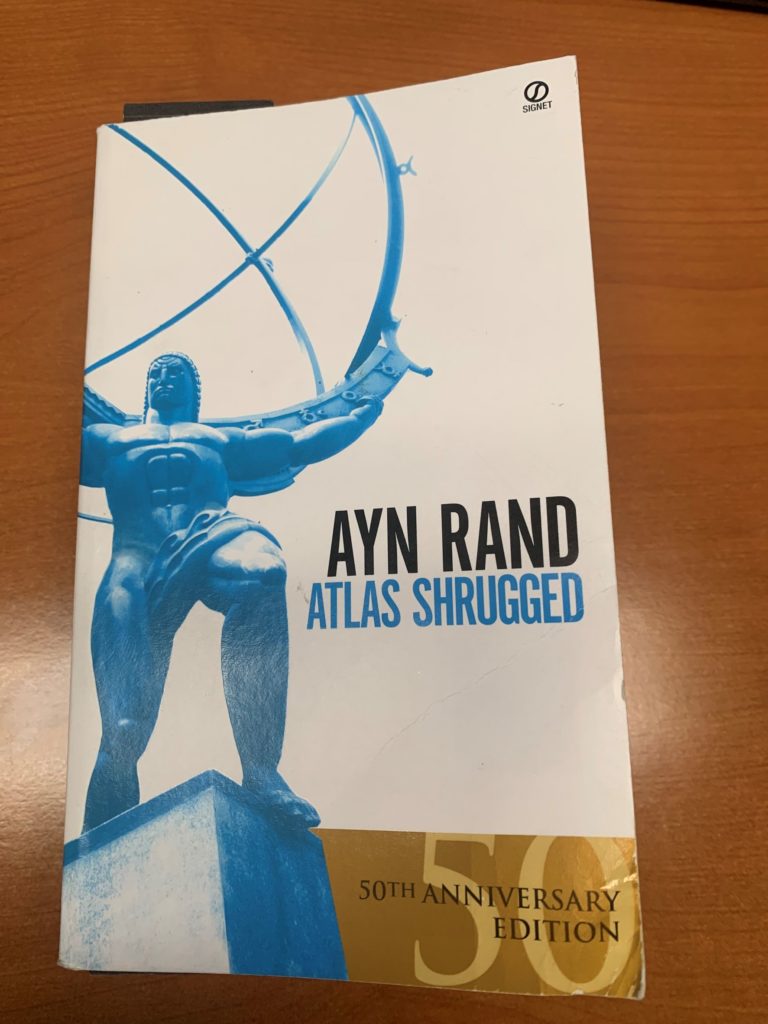There is some interesting stuff in this chapter. In fact, we get the explanation of the book title here. I won’t spoil it for you but I am going to talk all around it.
In a related note, I was looking up the other books by Ayn Rand and I ended up reading a little bit of bio on Wikipedia. She is originally from the Soviet Union so that explains her super keen insight into socialism/communism. I guess what I find bizarre is that 2020’s USA is following in the very same footsteps (insert forehead slap .gif).

If I skip what I think are the inconsequential events like Reardon gets caught cheating by his wife Lillian, that will keep me focused on the heart of the events of the chapter. This is what happens of significance.
Reardon refuses Dr Ferris’ (SSI) blackmail attempt. Reardon purchased more coal than allowing under Fair Competition Act. Ferris tries to use that information to get Reardon to sell the SSI the metal that he previously refused. Ferris implies that everyone who is successful (and not going to jail) falls in line with this quid pro quo line of actions.
Ken Danagger of Danagger Coal who was Reardon’s co-conspirator in the situation also was threatened by the SSI. The pair of them are put on trial for refusing to cooperate in the blackmail situation. As a result, Ken abruptly quits his business after a visit from a mysterious stranger. This is reminiscent of the Wyatt Oil situation at the end of section one, ‘Let er Burn’.
Finally, I will end the chapter summary with another insightful conversation between Hank Reardon and Francisco d’Anconia. Francisco seems to see the world here as Reardon just plows on through it. Meaning, he is just going to keep going no matter the obstacles in the way. Francisco term’s it as morality or that Hank is willing to work harder to make up for other’s deficiency.
This is eerie. When I look back at my un-happiness at my previous job, this is precisely why I was unhappy and I just figured it out after reading this chapter. I kept working harder to make up for other’s deficiencies. The more I worked, the more success I had but it still didn’t change the paradigm. Once you realize that the situation will never change no matter how hard you work, the only thing left is to pull the chute.
My mental state was definitely a result of morality. I am not going to expose anything here but there was definitely some shady dealings going on. Nothing was illegal, but morality is usually not a legal question but an ethical one. In my book, an unethical action is also a stupid action and that I can’t stand to be around. I see it as guilt by proximity. I guess that is why I kept fighting for change. And because it never did, I was miserable.
Don’t get me wrong, I am not happy with my new job either. The difference is that I am not really vested in the outcome. I have no power or responsibility other than to do my job. It very well may be the same thing, but ignorance is bliss.
End Your Programming Routine: Wow, I really got a lot out of that chapter. I don’t know whether to be angry or cry or be triumphant. In some ways, this book is getting depressing because all of these things are happening despite what we know. Rand wrote about this in the 1950s, we saw the fall of communism, we heard the stories of depravity and dysfunction yet we double down on the path of failure. I suppose the path to happiness is staying aloof of the outcome, just like my job.
Recent Comments